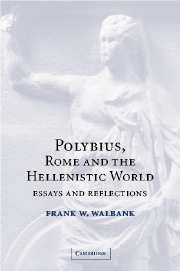Book contents
- Frontmatter
- Contents
- Preface
- Acknowledgements
- List of abbreviations
- 1 Polybian studies, c. 1975–2000
- HISTORICAL AND GEOGRAPHICAL PAPERS
- POLYBIUS AS A HISTORIAN
- 11 Timaeus' views on the past
- 12 Polybius and the past
- 13 The idea of decline in Polybius
- 14 Polybius' perception of the one and the many
- 15 Profit or amusement: some thoughts on the motives of Hellenistic historians
- POLYBIUS ON ROME
- TRANSMISSION OF POLYBIUS
- Bibliography
- Indexes
12 - Polybius and the past
Published online by Cambridge University Press: 22 September 2009
- Frontmatter
- Contents
- Preface
- Acknowledgements
- List of abbreviations
- 1 Polybian studies, c. 1975–2000
- HISTORICAL AND GEOGRAPHICAL PAPERS
- POLYBIUS AS A HISTORIAN
- 11 Timaeus' views on the past
- 12 Polybius and the past
- 13 The idea of decline in Polybius
- 14 Polybius' perception of the one and the many
- 15 Profit or amusement: some thoughts on the motives of Hellenistic historians
- POLYBIUS ON ROME
- TRANSMISSION OF POLYBIUS
- Bibliography
- Indexes
Summary
As my thanks-offering for the fifteen years hard labour he has put into producing LCM for our common good John Pinsent will expect something Polybian: for he is well aware that old dogs do not easily learn new tricks. I am therefore submitting to his highly critical eye some observations on Polybius' attitude towards the past. By that I do not mean that part of the past which makes up his basic theme – how in just under fifty-three years, from 220 to 168 bc, the Romans made themselves rulers of the whole known world – but rather his attitude towards the whole of the past, Greek and Roman, what in that past he regarded as important and how it linked up with the topic which he chose for his own Histories. For how a historian sees the past generally does not merely help to determine how he will approach his own particular topic. It is also relevant to the breadth of his historical understanding and humanity. In Goethe's words:
Wer nicht von dreitausend Jahren
sich weiss Rechenschaft zu geben,
bleib’ im Dunkeln unerfahren,
mag von Tag zu Tage leben.
For Polybius, it is true, three thousand years is more than we have any right to demand. For Greeks and Romans alike the significant past was much briefer than that. But in principle Goethe's words are true for Polybius, as they are for us all.
The historian's relationship to the past is a strange one.
- Type
- Chapter
- Information
- Polybius, Rome and the Hellenistic WorldEssays and Reflections, pp. 178 - 192Publisher: Cambridge University PressPrint publication year: 2002
- 1
- Cited by



